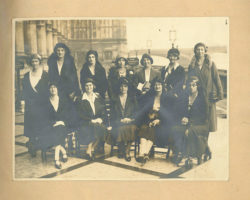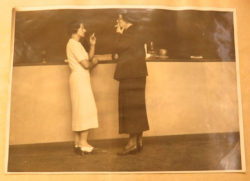The theme of this year’s International Women’s Day is Choose to Challenge. Churchill Archives houses the papers of hundreds of women who have done just that. You can read more about some of these papers in two blog posts which showcase the top archive collections concerning women in international life and politics and government. In this latter post, the collections of Florence Horsbrugh make the top 10. Who was she – and how did she ‘choose to challenge’?
Horsbrugh joined only 14 other women who were MPs up until the Second World War.
She began her political career representing the National Government as a Conservative MP for Dundee in 1931. She retired having been the first woman to: move the address against the King’s Speech in 1936, become the first female Conservative Cabinet Member in 1953, and serve in both Houses upon becoming a Life Peer in 1959. As Kenneth Baxter summarises, she was ‘one of the most notable MPs of either sex. (Kenneth Baxter, Estimable and gifted?: Women in party politics in Scotland c.1918-1955 (unpublished PhD thesis, University of Dundee, 2008), p. 205.)
Horsbrugh entered politics on the back of voluntary work for the Conservative and Unionist party in Scotland and war work running kitchens for the Ministry of Food in Chelsea, for which she received an MBE. Out of all the new MPs who entered the House in 1931, Horsbrugh was the most noteworthy – she was efficient in her conduct of her business and was an eloquent public speaker.
Fast forward to the Second World War and Horsbrugh occupied a crucial role as Parliamentary Secretary to the Minister of Health until 1945. She maintained an interest in foreign affairs; she was a delegate to the League of Nations Assembly from 1933 to 1935 and attended the San Francisco conference concerning the UN Charter in 1945. Though Horsbrugh lost her seat in the 1945 Labour landslide, she went on to win the Manchester Moss Side seat just 5 years later. Her reward from Churchill was her appointment as Minister for Education (1951-1954).
Horsbrugh very powerfully chose to challenge the conventions of female political activity – taking several first steps of someone of her sex. Yet, this blog post doesn’t merely seek to highlight women who challenged – but also the sources we used to write our political histories.
Amongst Horsbrugh’s collections of correspondence, speeches, photographs, souvenir, and family history material. Also included were her series of scrapbooks, most of which were dedicated to her first 6 years as an MP.

A photograph of the newly-elected female Conservative politicians (bar Marjorie Graves) on the House of Commons Terrace in November 1931. Florence Horsbrugh is on the far right of the back row. Churchill Archives Centre, The Papers of Florence Horsbrugh, HSBR 2/3.
Horsbrugh’s first scrapbook opened with centralised glossy photograph of the newly-elected female Conservative MPs sitting on the terrace at the House of Commons. In the articles which followed, journalists and politicians commended Horsbrugh’s professionalism, seriousness, and efficiency in the conduct of parliamentary business.
An article published in The Daily Telegraph in September 1931 was characteristic of such praise. In it, MP for Attercliffe Cecil F. Pike, noted how Horsbrugh exhibited ‘both outstanding character and ability…Dundee need have no regrets at having entrusted its political destiny in her hands’. (Daily Telegraph cited in Florence Horsbrugh, Scrapbook, Cambridge, Churchill Archives Centre, The Papers of Florence Horsbrugh, HSBR 2/3, 1931-1932.) Conveniently, Horsbrugh used this press commentary to portray herself as one of, if not the, strongest of female MPs.
Alongside recording her work on the national stage, Horsbrugh also included items which extolled her work on an international stage. She pasted newspaper commentary noting how she was the only woman to attend the 16th Ordinary Session of the League of Nations. This wasn’t Horsbrugh’s first time participating in the League of Nations. No, this was her third time, an unusual opportunity for any politician of the period.

Photographs of Florence Horsbrugh at the Sixteenth Ordinary Session of the League of Nations in September 1935, pasted towards the end of her scrapbook. Horsbrugh is the smoker on the right-hand side.
Flicking towards the end of Horsbrugh’s scrapbook we find she also included several photographs. One of these showed her smoking with another unidentified female delegate. Horsbrugh, known for her smoking habits, was shown literally dragging on the cigarette, in contrast to the other woman who held the cigarette daintily in her hand.
Visually, the photograph is striking. Horsbrugh’s black dress contrasts against the white dress of her fellow smoker – made all the more powerful against the backdrop of a bar. Smoking was a powerful statement of how women, as Penny Tinkler writes, ‘laid claim to male privileges and asserted their right to equality in all spheres of life’. (Penny Tinkler, ‘Sapphic smokers and English modernities’, in Sapphic modernities: sexuality, women and national culture: sexuality, women and English culture, ed. Laura L. Doan and Jane Garrity (Basingstoke: Palgrave Macmillan, 2006), p. 79.) It showed women enjoying a smoking break together, which would have been welcome after long hours spent couped up in conference hours. Horsbrugh’s presence at the League of Nations, and her specific smoking presence at that, shows to us the increasing equality of her own position as a woman in an international arena.
Horsbrugh was, in short, one of the most notable Parliamentarians of her time. Despite this, little personal material survives about how she understood and represented her own political participation. Her scrapbooks show her writing with scissors, crafting her own material legacy from a range of ephemeral material.
Today on International Women’s Day, Horsbrugh’s political achievements are testament to her ability to challenge the gender norms of the period, which placed her in a minority in the political establishment. Her records too also challenge us to be resourceful and imaginative in turning to scrapbooks to understand how she wanted her legacy to be remembered.
By Cherish Watton, a PhD student at Churchill College, studying a history of scrapbooking in Britain from 1914-1980. This blog is based on Cherish’s MPhil research, funded by Churchill Archives Centre studentship in the Arts and Humanities. In her free time, Cherish runs a website on the work of the Women’s Land Army.
Further Reading
- Baxter, Kenneth. ‘Estimable and gifted? Women in Scottish politics, c.1918-55’ (unpublished PhD. thesis, University of Dundee, 2008).
- Baxter, Kenneth. ‘Florence Gertrude Horsbrugh’. Conservative History Journal, Winter 2009.
- ———. ‘“The advent of a woman candidate was seen … as outrageous”: women, party politics and elections in interwar Scotland and England’. Journal of Scottish Historical Studies 33, no. 2 (28 October 2013): 260–83.
- Dean, Dennis. ‘Consensus or conflict? The Churchill government and educational policy, 1951-55’. History of Education 21, no. 1 (January 1992): 15–35.
